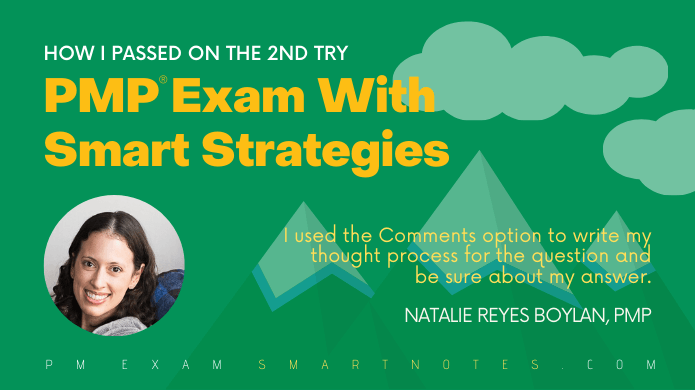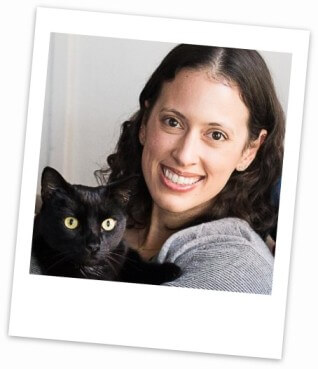 Natalie Boylan passed her PMP® online exam recently. When I heard about her interesting online exam experience I reached out to ask if she can help the community of PMP® aspirants. I’m thankful that she obliged and shared her smart strategies and study tips in quite a detail in this article.
Natalie Boylan passed her PMP® online exam recently. When I heard about her interesting online exam experience I reached out to ask if she can help the community of PMP® aspirants. I’m thankful that she obliged and shared her smart strategies and study tips in quite a detail in this article.
Natalie is an experienced PM with a background is in Marketing. She hold an MBA in Marketing & Strategy from UC Davis, and she’s based out of Sacramento, CA.
What made you take up PMP® certification?
Overall, I was looking to add more legitimacy to my project management skills. I had the hands-on work experience but had never taken any formal PM training, other than a one-unit course while earning my MBA.
While looking around at PM roles, PMP® certification was highly recommended for many of the top companies. I knew that in order to position myself as the best candidate, I would need to earn my certification. I did not consider any other certification exams.
What was the benefit you’d expect from PMP certification?
 Definitely the legitimacy that comes with earning such a weighty certification like the PMP®. I hoped it would make me more competitive and desirable in the job market and within an organization.
Definitely the legitimacy that comes with earning such a weighty certification like the PMP®. I hoped it would make me more competitive and desirable in the job market and within an organization.
Now I see the PMP® helping me not only with what I just mentioned, but also with making me a better project manager!
I am looking forward to the continuous learning that comes with being a PMP® by earning my PDUs.
You may be interested: Check if these top PMP® strategies will help you.
Which study resources did you consider for the exam preparation?
I actually took the exam twice, once in 2018 and once in 2020.
I sort of took the exam on a whim in 2018 – I knew I wanted the certification but I didn’t fully realize until I was sitting in a four-day prep class the magnitude of the exam and just how difficult it was going to be to pass. The main resources I used were the in-person class and the materials they provided ($1000), a copy of the PMBOK I rented from the library (free), and Joseph Phillip’s Udemy Course which I only ended up watching 2 hours of.
The class moved very quickly through the materials and really emphasized the brain dump portion. My strategy was just to absorb as much as I could to prepare for the exam and know the formulas to write down as soon as the test started.
In all I had just 2 months between when I first took the prep class and when I took the exam, which for me, was not enough time to really understand the materials. I think I did this because the instructor encouraged us to not wait too long to take the exam to avoid losing steam. I ended up failing the exam and then got too busy with work and life to reattempt it within the year.
In February 2020 I was laid off due to company restructuring.
Smart way to prepare for PMP exam, Free daily PMP® questions with contextual study notes: Like the Facebook page, Join the LinkedIn group, Subscribe for free PMP® videos.
The second attempt
Once COVID-19 hit and I knew looking for a new job could potentially take months, I decided I needed to be productive with my transition period and attempt to take the PMP® again. Since I was unemployed and the exam was expensive enough, I knew I couldn’t spend a ton of money.
In the meantime I was reminded that I had paid for the Udemy course and it was still active, so I used that to regain my 35 contact hours. I rented a copy of the PMBOK to read through. I also paid for four weeks to take quizzes and tests daily in the PMI PMP® App (blue mobile app) the month leading up to the exam.
Next, I read through posts in the I Want to Be a PMP® group on LinkedIn and asked questions. I watched a ton of YouTube videos and found every free resource I could, even signing up for free week-long trials of amazing sites like the PM PrepCast.
I also created ITTO Flashcards where I cut out the ITTO tables and would try to guess which process it was for. Plus, I went to Kinkos and printed our Richard Vargas’ process chart and connected all of the processes and watched the video multiple times.
As with the study plan I created one for myself and made sure I was reviewing information everyday, even if it was just taking a quiz on my phone.
I had 4 months to prepare for the exam and really focused on understanding and knowing the material and thinking of real-life experiences to relate everything to.
How did you approach the exam?
I looked at the study plans of past PMP® test takers and created my own study plan.
At a high level, my approach was to take one full exam each week, review my answers, and spend the rest of the week learning more about the topics and knowledge areas connected to my incorrect responses.
As I got closer to the exam, I took two exams a week, reviewed my answers, and continued to address my weaknesses.
Any issues along the way?
My biggest issue was just the emotional roller-coaster of studying!
I would feel like I was making progress with understanding concepts as I studied, then I would take an exam and score anywhere between 60-70%, which would totally deflate that confidence since I knew I should be getting around an 80% to pass (as a thumb rule).
Having the mental stamina to keep studying and trying to improve when I didn’t feel like I could fit any more information in my brain was the biggest challenge! When I began to felt like this I would take a break and try to clear my head by focusing on something I enjoy doing (gardening, going for a walk, etc.). Then I would come back to the material later with a clearer head.
Also read: How 2 friends studied for PMP together and cut the time by half!
The week before the exam is crucial. What was your approach to study during this week?
The week before the exam I took a full-length exam everyday, reviewed the questions I got wrong, then looked up YouTube videos about the topics I was still repeatedly missing.
This was also the week where I tried to memorize EMV formulas (which I had been struggling with the whole time) and the WHY behind the EMV terms. I thought this was necessary so that come test day, even if I forget the formula, I could try to get to the answer with the understanding of what was being asked.
Then I also watched a few of the high-level process videos and ITTO videos to better understand how the inputs and outputs connected the various processes.
Also, I aimed to really understand where project documents were initially made how they flow through the project.
How was your online PMP® exam experience?
I took the online exam in a spare room at my parents house since my apartment was too hectic.
The check-in process took a long time and was a little confusing. My exam was supposed to begin at 10 am and I began check-in at 9.30am. But didn’t actually begin the exam until about 10:10 am.
The proctor chatted me twice during the exam. Once asking me to remove my hand from my mouth (you are not allowed to cover your mouth during the exam). And once to ask me to stop whispering the questions to myself (which I was doing to help concentrate on the question).
Having the proctor intervene twice at the beginning of the exam made me pretty paranoid and stressed for the rest of the exam and I tried to be as still and as silent as I could the rest of the time!
The questions were pretty difficult, I flagged probably 40% of the questions in each section to then review later.
I also highlighted key terms and struck through answers I knew were wrong.
I didn’t get many EMV questions or questions requiring a calculator, most of them were situational.
Overall, I used the whiteboard only about 5 times to do a few network diagrams and other visuals.
Watch 2-hr of free mind-map based PMP® training
(click the Preview button for the content under Course Curriculum section) >>> Click to watch 2-hr mind-map training from The PM Exam Last Mile Prep Program now! <<<
>>> Click to watch 2-hr mind-map training from The PM Exam Last Mile Prep Program now! <<<
The comprehensive, brain-friendly PMP® prep program exam toppers have been secretly using.
Would you have any study tips for those preparing for their PMP® exam?
My advice would be just to be persistent and try many different study techniques to see what works best for you. Some of the ones you can consider are visuals and videos, reading, taking notes, listening to a podcast, etc. You may discover that a combination of 2-3 of these will float your boat, then that would be it!
Secondly, don’t be afraid to take the practice exams because they will only make you better if you learn from your mistakes! Mock tests probably are also a great way of learning for your exam, especially the gap areas!
I wish you all the best!



